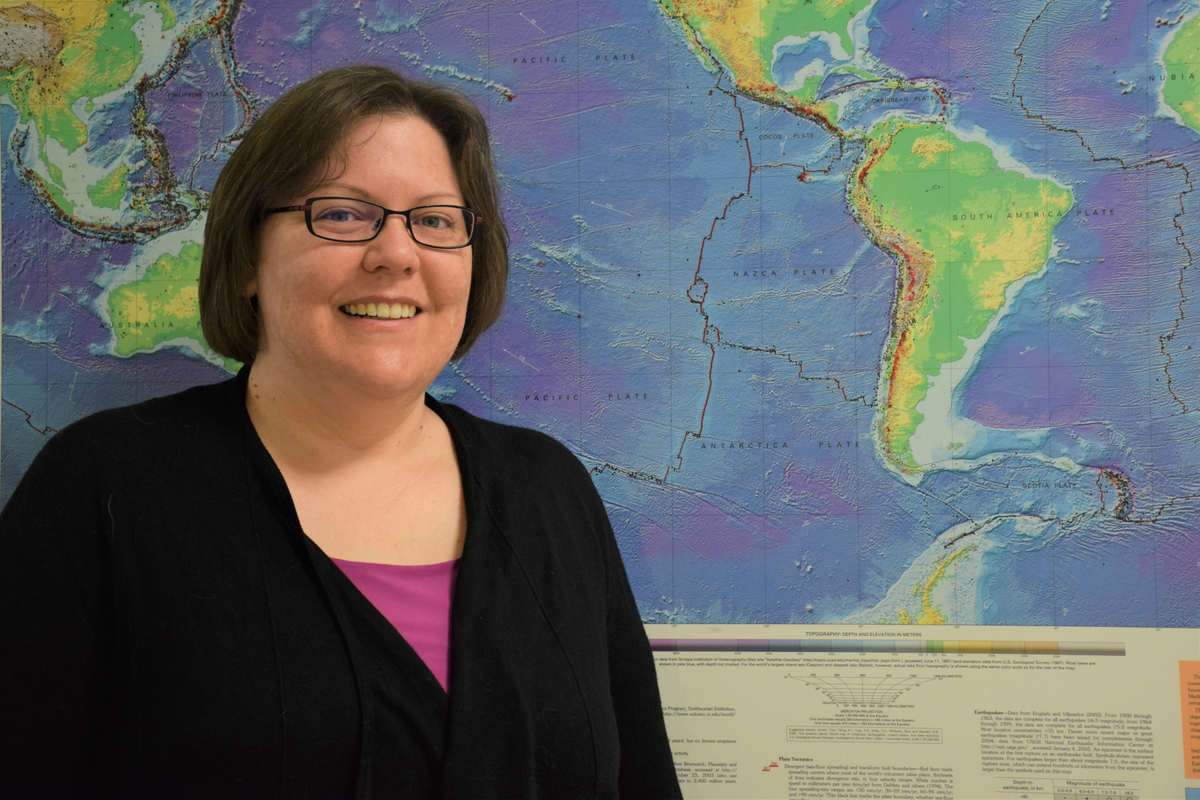
Meet Claire Currie, our September 2018 Instructor of the Month and associate professor with a passion for geophysics. Photo credit: Michaela Ream
What do you teach?
I teach students in the geophysics program, as well as people in the Earth and Atmospheric Sciences, and a few engineering students. I teach a range of courses from second year, which are really introductory courses, to fourth year graduate courses.
Why should people learn about this?
I think that Earth is very interesting; there are a lot of fun processes and lots of fun stuff going on on Earth. Going from earthquakes and volcanoes-and understanding what causes them-all the way down to questions like: how did the Earth form? How is it evolving? Why do we have mountain belts? Why do we have ocean basins? The field offers a chance to understand what we see on the surface of the Earth and where it all came from.
What's the coolest thing about this subject area?
In terms of my own research, I think it's that we can look at the surface of the Earth and learn a lot about what's going on deep inside the planet. So for example, why do we have tall mountains on the Earth? That tells us a lot about what's happening way below our feet. Because we aren't able to drill down to the core of the Earth, the only way we are able to tell that the Earth has a core is by making measurements on the Earth's surface. We do this by listening to seismic waves that have passed through the Earth and seeing how they get deflected and bounced off of things in the Earth's interior. So just being able to make that recording on the surface of the Earth, and then being able to learn about something that is happening five or six thousand kilometres below our feet-that's pretty cool.
What was your favourite learning experience as an undergrad, and how do you incorporate that experience into teaching your students?
"Geophysics integrates ideas from all sorts of areas of science like physics, math, and chemistry, into a coherent understanding of the Earth-so it's very applied." -Claire Currie
What I liked the most and what I think is cool about geophysics, and why people should learn about it, is that it is very applied. Geophysics integrates ideas from all sorts of areas of science like physics, math, and chemistry, into a coherent understanding of the Earth-so it's very applied.
What I liked the most as an undergraduate was looking at real world examples and being given real world data to analyze, rather than some kind of contrived data set that's perfect. You're getting data that is what you would actually find when collecting data in the field, then going through the whole process from processing and analyzing the data to interpreting the data; so I try to bring in a lot of real-world examples into my class.
What was it that drew you to this field?
Earthquakes. Ever since I was a really young teenager I wanted to study earthquakes, and I learned that in order to become a seismologist I needed to study geophysics; so that's what I did.
I'd say that my path is unusual. Most people don't know from an early age that they want to study geophysics-mostly people don't even necessarily know about geophysics-and people will often come into the field later by taking a first year geology course or sitting in on one of the geophysics introductory courses.
You've previously been taught the Geophysics 436 field school. What do you think is the importance of students having that field school experience during their studies?
I think having that hands-on experience for our undergraduates is essential because just understanding how you collect the data and all the logistics that go into field work is incredibly important. You understand where the data came from, as well as potential complications in the data.
And it's completely hands-on. Students go for about a week to southern Alberta and they look at a range of geophysical methods. So they go out, they've got the instrument, they have to set them out in the field, they have to determine how they will set out the instruments, then they collect the data, and then on-site they will do a little of the processing of the data. In our geophysics classes we teach that "here's what a seismometer looks like" and it can seem like "oh, you just go put it in the ground and start recording"-but actually in practice there's a lot more that goes into it.
What is one thing that people would be surprised to know about you?
I was born in South Africa and I lived there for the first five years of my life.